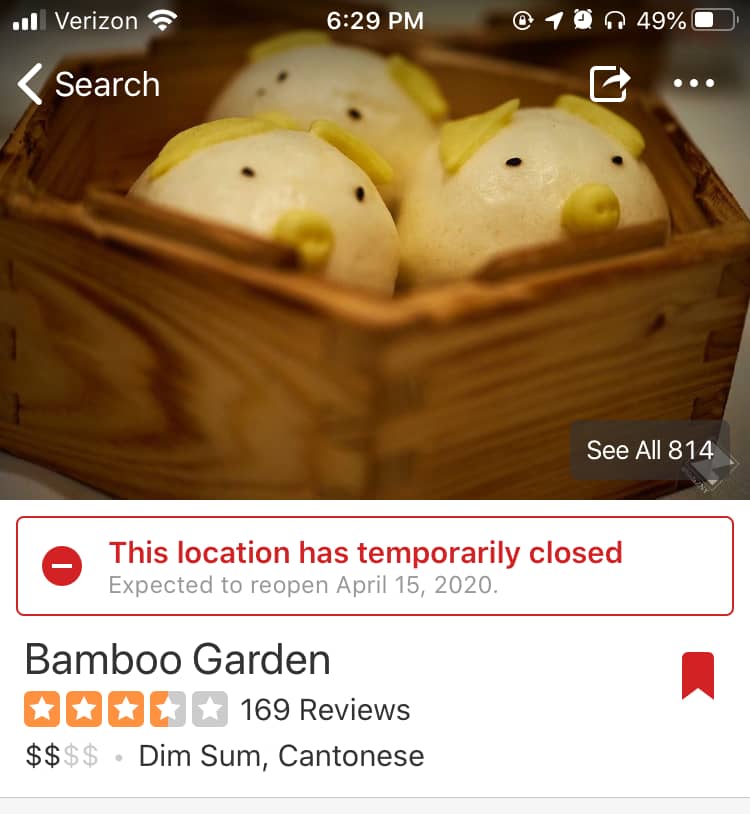Advisory
How to protect your customers and your business during a pandemic
A collection of the best advice I've seen on how businesses can adapt to and weather COVID-19 (Coronavirus)
by Kenny Chung
Advisory
How to protect your customers and your business during a pandemic
A collection of the best advice I've seen on how businesses can adapt to and weather COVID-19 (Coronavirus)
by Kenny Chung
1) Follow official guidelines.
I cannot stress this enough. If your local government says you shouldn’t fill your venue to capacity, then don’t. If they say to close your shop, then shut it down. For instance, the mandate from the NYC government is to limit restaurant/bar capacity to half (note: this post will mostly use NYC examples as they are most top of mind for me). In other regions like Illinois, all restaurants and bars will be closed through the month of March. When in doubt, err on the side of caution. There are many restaurateurs urging NYC Mayor de Blasio to close all restaurants/bars (a stance I agree with). It’s a tough position to be in – people’s livelihoods are on the line, but so are their lives.
Bamboo Garden (one of the big four Brooklyn Chinatown dim sum restaurants) marked as temporarily closed on Yelp.
2) Consider voluntarily closing down.
In Brooklyn Chinatown, four of the major dim sum restaurants have all temporarily closed. Some of this is due to lingering racism against Chinese people due to the Wuhan bat soup video debacle (which is now known to not only be inflammatory, but also inaccurate).
Shutting down your main income stream is not a decision to be taken lightly, and you’ll likely need to consider long-term viability. But I suggest reading the tea leaves (so to speak), as it’s better to be ahead of the curve than behind the eight ball on this one.
Of course, you should let you customers know if you’re closing across all digital media channels. Add a note on your website, update your local listings, and spread the word on social media.
3) Apply for government assistance.
If you’re on the fence about closing for financial reasons, be aware of local government programs that may offer assistance. In New York City, the Small Business Services department has stood up a webpage to inform business owners about grants and loans available to them in these tough times.
Additionally, many restaurateurs have taken to publicly call on government officials to provide more guidance and assistance. David Chang, for instance:
Hey @NYGovCuomo @NYCMayor @AOC @SenSchumer @SenGillibrand et al.
Restaurants are too small to fail. Please act quickly. Thank you — Dave Chang (@davidchang) March 15, 2020
Government assistance doesn’t just apply to business owners. Unemployment insurance is available if a business temporarily closes. I can go on an hour-long rant about the NYS Unemployment Insurance system, but it is an overall positive program, and the safety net should be utilized as intended by all who need it. The NYS Department of Labor is even cutting down on the typical 7-day wait period for benefits to kick in.
One note (from personal experience): apply as soon as possible. Benefits are not retroactive!4) Encourage delivery/takeout.
If you’re not closing, then limit interaction with and between customers by offering delivery/takeout. Services like Seamless/GrubHub will be deferring commission fees for restaurants affected by COVID-19.
I’ve also seen restaurants like Paulie Gee’s adjust their menu to offer takeout options for the very first time.
View this post on InstagramA post shared by Paulie Gee (@pauliegee) on
5) Gift Cards
Lastly, this was based on an idea I saw on Twitter. If a local business offers gift cards, consider buying one now for future use. The businesses will get that money now, and you won’t need to spend an extended amount of time in their location in the near term.Want to support your local businesses, but you’re self-isolating and/or social distancing? Buy their gift cards! 🎁 Shops and restaurants get a desperately needed cash infusion now and you can use their products and services down the line. Win-win! 🎉
— Jamie O’Grady ⚡ (@JamieOGrady) March 15, 2020

